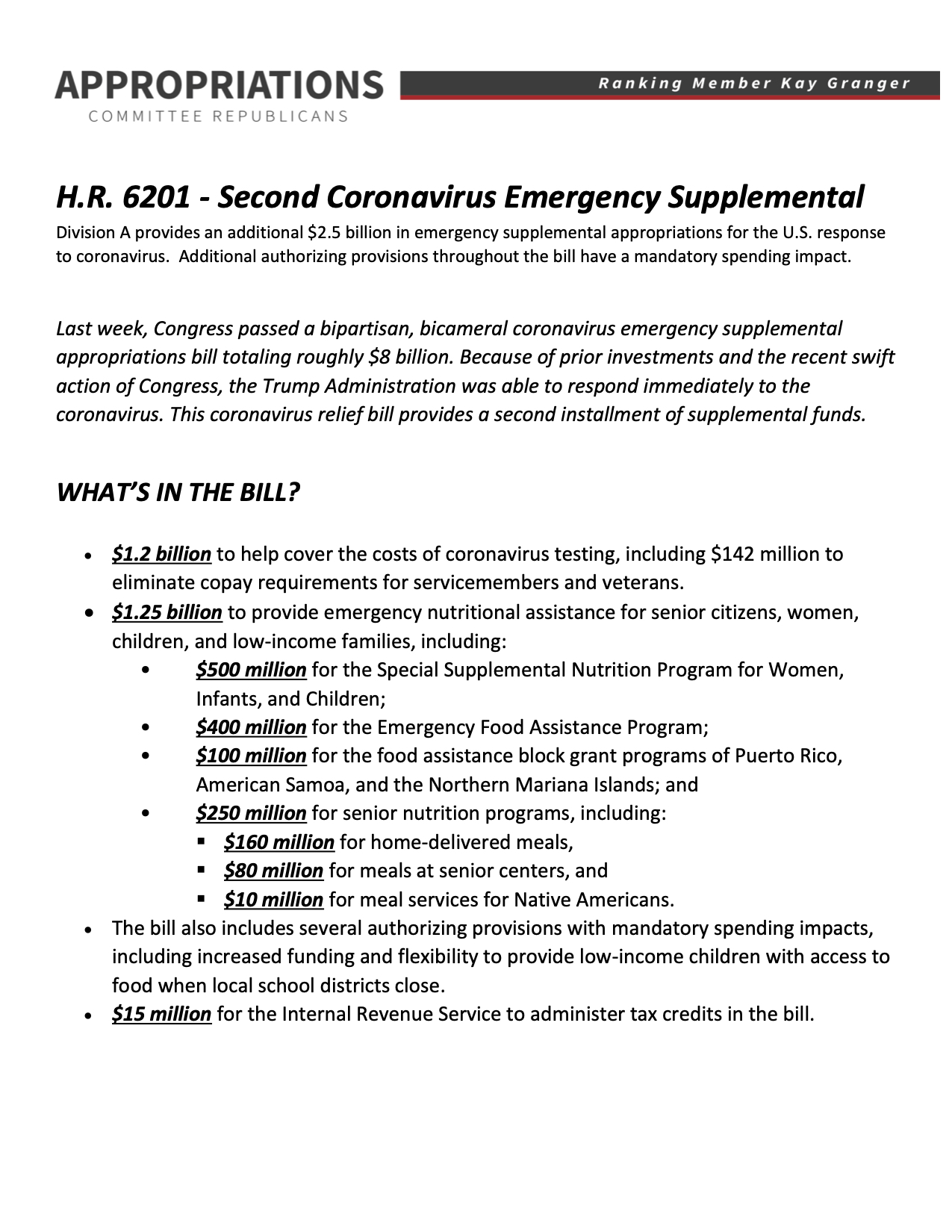House Leads on Coronavirus Response
Top line: Despite the rapidly changing national circumstances driven by COVID-19, the House of Representatives has voted to provide direct assistance to the American people in this difficult time.
The Families First Coronavirus Response Act was passed by an overwhelmingly bipartisan vote of 363-40. This legislation provides immediate, targeted relief to American workers affected by COVID-19 and supports public health agencies fighting this virus. Republicans worked to ensure that resources in this legislation are temporary measures to address a public health emergency, not permanent entitlements, through the inclusion of sunset provisions. On Monday, the House agreed to a technical corrections bill by unanimous consent to ensure that the legislation reflects the agreement reached on Friday.
President Trump fully supports the bill and stands ready to sign it as soon as it passes in the Senate.
H.R. 6201 — THE FAMILIES FIRST CORONAVIRUS RESPONSE ACT:
- Ensures free testing for all Americans:
- Requires all commercial insurance, Medicare, Medicaid, CHIP, Indian Health service, and TRI-CARE to cover, and impose no cost-sharing for testing diagnosis of COVID-19
- Appropriates $1.2 billion to help cover the costs of coronavirus testing, including $142 million to eliminate copay requirements for service members and veterans
- Requires paid sick leave for impacted American workers:
- Businesses with fewer than 500 employees are required to provide 14 days of paid sick leave to employees affected by COVID-19.
- The vast majority of businesses with more than 500 employees already offer paid sick leave.
- Businesses with fewer than 500 employees will receive a 100% tax credit for both types of leave up to capped levels, credited against quarterly payroll taxes
- Additionally, under the Family and Medical Leave Act (FMLA) expansion, employees unable to work due to childcare circumstances, like a closed school, are entitled to at least 10 weeks of paid leave at two-thirds of the employee's pay
- Additionally, the Secretaries of Treasury and Labor will have regulatory authority to provide flexibility so small businesses under 50 employees are not unduly harmed
- Affected employees include those with COVID-19, under quarantine, caring for someone affected, and with children whose school has closed.
- These provisions sunset after December 31, 2020
- Businesses with fewer than 500 employees are required to provide 14 days of paid sick leave to employees affected by COVID-19.
- Provides for vulnerable Americans:
- $1.25 billion to provide emergency nutritional assistance for senior citizens, women, children, and low-income families, including:
- $500 million for the Special Supplemental Nutrition Program for Women, Infants, and Children (WIC)
- $250m for senior nutrition programs, including home-delivered nutrition programs like Meals on Wheels
- $400m for the Emergency Food Assistance Program
- Provides funding and flexibility to ensures low-income students continue to have access to meals if schools are closed
- Provides the Agriculture Secretary with the authority to waive administrative requirements that might prevent children and parents from accessing nutrition programs
- $1.25 billion to provide emergency nutritional assistance for senior citizens, women, children, and low-income families, including:
- Bolsters unemployment insurance:
- Provides $1 billion in 2020 for emergency grants to states for activities related to processing and paying unemployment insurance (UI) benefits, under certain conditions
- $500 million would be used to provide immediate additional funding to all states for staffing, technology, systems, and other administrative costs, so long as they met basic requirements about ensuring access to earned benefits for eligible workers
- Full Federal Funding of Extended Unemployment Compensation for a Limited Period. For states that experience an increase of 10 percent or more in their unemployment rate (over the previous year)
MORE INFO ON THE CORONAVIRUS RESPONSE ACT:

Click here or on the image above to download a messaging one-pager, courtesy of the House Appropriations Committee
PRESIDENTIAL ACTION
The President has also taken critical steps to address the crisis through executive action, including actions that will mitigate transmission, increase and accelerate testing capabilities and provide vital support to hospitals and communities.
- Declared a national emergency, opening up access to over $42 billion in funds.
- Implemented travel restrictions to China, Europe, Iran, and other coronavirus hotspots.
- Expanded airport screening to identify travelers potentially carrying coronavirus.
- Issued emergency approval for new commercial coronavirus tests and cut red tape to immediately expand testing availability.
- Accelerated development of coronavirus therapeutics and work on a vaccine.
- Assembled private sector companies like Walmart, Target, CVS, and Google to assist in our coronavirus response.
- Implemented disaster loans for small businesses affected by coronavirus.
- Waived interest on student loans held by the government.
- Announced guidelines on social distancing and mass gatherings in order to slow the spread of coronavirus.
IMPORTANT CDC RESOURCES TO SHARE WITH YOUR CONSTITUENTS
- Prevention and Treatment
- What to Do If You Are Sick
- FAQs: Coronavirus Disease-2019 (COVID-19) and Children
- Get Your Household Ready for Coronavirus Disease 2019 (COVID-19)
Bottom line: The full weight of the federal government is bent on slowing the spread of this virus and preparing our communities to cope with potential economic and public health consequences. The House of Representatives has led this effort and will continue to provide assistance to the American people throughout this crisis.
